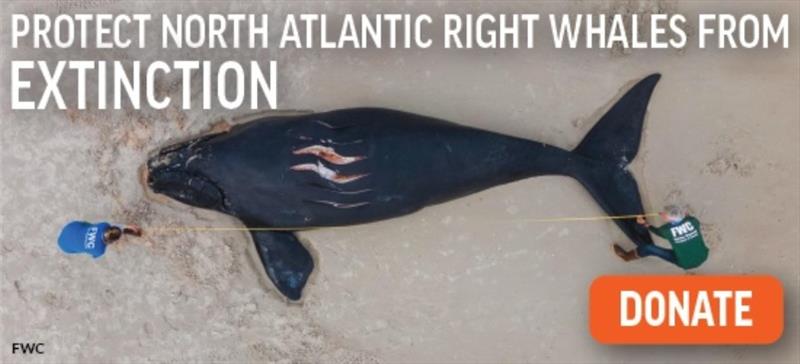
North Atlantic right whales are in trouble - How you can help
by Sailors for the Sea 17 Apr 2021 11:31 UTC

Save North Atlantic right whales © Sailors for the Sea
Recently, a critically endangered North Atlantic right whale calf was struck by a vessel off the coast of Florida and washed up dead. The calf had deep propeller cuts on its back and head, broken bones and a cracked skull. Several days later, the calf's mother, Infinity, was spotted alive with similar propeller wounds.
This loss is devastating for a species with only about 360 individuals left.
This season, 17 new North Atlantic right whale calves have been spotted, offering us some hope. Sadly, we've already lost one of these precious calves. To lose more could be catastrophic
We can save North Atlantic right whales from extinction, but only if we act fast. Our Spring Green Boater Drive kicks off today, and right now the best thing you can do is donate to protect our oceans and power our binational campaign in the U.S. and Canada to save North Atlantic right whales from extinction.
North Atlantic right whales are slow, swimming around six miles per hour, usually near the water's surface. They are also dark in color and lack a dorsal fin, making them very difficult to spot in the water. At normal operating speeds, many vessels cannot maneuver to avoid them, putting these whales at great risk of being struck, which can cause deadly injuries from blunt-force trauma or cuts from propellers.
We know what needs to be done. Slowing ship speeds to 10 knots or less in areas where North Atlantic right whales frequent can reduce death from collisions by 86 percent. That's why Sailors for the Sea, with Oceana, campaigns to require vessels to slow down in these areas.
With your support, we're making real progress for North Atlantic right whales:
- NOAA acknowledged its own vessel speeds regulations related to North Atlantic right whales need to be strengthened in protecting these whales from deadly vessel strikes.
- Transport Canada instituted a voluntary slowdown measure last year to protect critically endangered North Atlantic right whales from deadly ship strikes in the Cabot Strait, a heavily trafficked passage used by right whales.
- Oceana increased transparency of ship speeds in whale protection zones by launching Ship Speed Watch, an innovative tool that allows users to monitor a ship's location and speed in mandatory and voluntary speed restriction zones in near real-time.
You can help continue our fight for the survival of these critically endangered whales, before it's too late.
Donate now to support our campaign to save North Atlantic right whales from extinction and protect our oceans for generations of sailors to come.
With your gift of $50 or more, we'll send you this exclusive Sailors for the Sea Powered by Oceana reusable bag. Pitch in $100, and we'll also include our Green Boater burgee. Don't wait because this offer only lasts until April 30.
As a boater, you know the feeling of awe when you see these majestic animals thriving in our oceans. Please, support our work to save these iconic whales before they are gone forever.